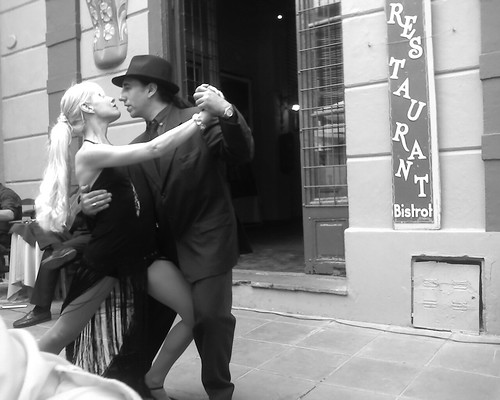
It’s that time of year again: local police departments are, in theory, promoting bicycle and pedestrian safety by . . . issuing warnings and tickets to bicycles and pedestrians. The folks over at BikeArlington just saw two cyclists pulled over on Wilson Blvd for running a light. Considering what a rarity that is, I assume that it’s part of this year’s Street Smart campaign.
Street Smart is an annual public education, awareness and behavioral change campaign in the Washington, DC, suburban Maryland and northern Virginia area. Since its beginning in 2002, the campaign has used radio, newspaper, and transit advertising, public awareness efforts, and added law enforcement, to respond to the challenges of pedestrian and bicyclist safety.
The Street Smart program emphasizes education of motorists and pedestrians through mass media. It is meant to complement, not replace, the efforts of state and local governments and agencies to build safer streets and sidewalks, enforce laws, and train better drivers, cyclists, and pedestrians.
I don’t really have any problem with enforcement actions against unsafe behavior on anyone’s part. However, I’m not really a fan of this program, as it combines arbitrary enforcement, a focus on the wrong parties, and I suspect that it is mostly ineffective at actually improving safety.
The “Street Smart” program is scheduled to run March 15 to April 15, but I suspect the good weather that just arrived won’t only bring out more cyclists, but also more officers who are willing to get out of their cars to issue warnings/citations. So stay alert, and don’t assume that what was fine last week is fine this week.
I don’t pretend to have any legit claim on this song. Â It was well after that it was released that I first heard it. Â And when I did – flying down Highway 99 – it hit me like a ton of bricks. Â Placebo explains:
[youtube]http://www.youtube.com/watch?v=YnZf0Ep57Rk[/youtube]
But it’s not Placebo’s song. Â We owe Kate Bush for its existence:
[youtube]http://www.youtube.com/watch?v=GuLlwUaEyr0[/youtube]
And some have tried to expand it:
Running Up That Hill from John Forte on Vimeo.
But I think it’s been nailed. Â So much so that no one else should attempt it. Â The Chromatics:
[youtube]http://www.youtube.com/watch?v=LUQaocQCMTs[/youtube]
For reasons quite related to my previous post, this Digital Due Process effort is a step in the right direction:
As part of a broad coalition of privacy groups, think tanks, technology companies, and academics, the Electronic Frontier Foundation (EFF) today issued recommendations for strengthening the federal privacy law [the Electronic Communications Privacy Act of 1986] that regulates government access to private phone and Internet communications and records, including cell phone location data.
It’s an interesting coalition of rights-advocates (who are focused on the privacy of the individual) and businesses (which would benefit from more clarity in the law insofar as it 1) reduces their costs in dealing with legal uncertainties, and 2) creates more confidence in cloud-based services). Specifically, they want to:
The group’s four recommendations focus on how to update the Electronic Communications Privacy Act (ECPA), a law originally passed in 1986 before the World Wide Web was invented and when the number of American cell phone users numbered in the tens of thousands rather than the hundreds of millions. The group recommends that the legal standards under which the government can obtain private communications and records be clarified and strengthened in order to:
* Better protect the privacy of communications and documents you store in the cloud
* Better protect you against secret tracking of your location through your cell phone or any other mobile device
* Better protect you against secret monitoring of when and with whom you communicate over the telephone or the Internet
* Better protect innocent Americans against government fishing expeditions through masses of communications data unrelated to a criminal suspect
This is going to be a long-term project, and I think we can expect a lot of pushback from law enforcement (both declared and those in the intelligence fields who would rather exploit the existing grey areas). Â But it’s a positive move.
This is just one of many reasons why you should be contributing to the Electronic Frontier Foundation:
A couple weeks ago, Sen. Rockefeller partnered with Sen. Olympia Snowe to introduce a major revision to the bill that, among other things, made changes the emergency “kill switch†provision. The revision was adopted by the committee last Thursday and the bill was approved. It’s now ready for consideration by the full Senate.
The revised bill would require the President to develop an “emergency response an restoration†plan with the help of private industry and other government agencies, but it is vague enough that it does not actually limit what the plan can include. The President would still have authority to declare an emergency and implement the plan without first seeking congressional approval, though he would have to report to Congress within 48 hours after declaring an emergency. The revised bill also doesn’t require the plan to be made public, so it could potentially give the President the same authority to restrict internet access as the original bill did, just without being explicitly and publicly stated in the legislation itself.
I’m sure people like former DNI Mike McConnell will trot out their cyberscare stories (see this great piece on how anyone using “cyber” is usually full of it.) declaring just how essential it is that we lock down the Internet. Â Not too long ago, McConnell was out pushing this line:
We need to develop an early-warning system to monitor cyberspace, identify intrusions and locate the source of attacks with a trail of evidence that can support diplomatic, military and legal options — and we must be able to do this in milliseconds. More specifically, we need to re-engineer the Internet to make attribution, geo-location, intelligence analysis and impact assessment — who did it, from where, why and what was the result — more manageable. The technologies are already available from public and private sources and can be further developed if we have the will to build them into our systems and to work with our allies and trading partners so they will do the same.
Wired’s Ryan Singel helps clarify that:
Re-read that sentence. He’s talking about changing the internet to make everything anyone does on the net traceable and geo-located so the National Security Agency can pinpoint users and their computers for retaliation if the U.S. government doesn’t like what’s written in an e-mail, what search terms were used, what movies were downloaded. Or the tech could be useful if a computer got hijacked without your knowledge and used as part of a botnet.
Yeah, I think I’m going to pass on the advice of industry players that have devoted their lives to concealing the truth from the public. Â I just fear that they’ll be as successful with this effort as they have been before. Â That is, they never do manage to actually conceal the truth. Â All they need to do is convince enough of the generally-uninterested public to trust their version, and the public will go along with it. Â And, for the most part, that’s been a massively successful strategy. Â I used to think the Internet would help put an end to that. Â But more and more it looks like that might help put an end to the Internet.
Jamie Oliver‘s Food Revolution is available on Hulu.com. I’m not really a fan of “reality tv”, and the premise – that a Brit can help out a West Virginia town by showing them what’s good for them – is more than a little eye-rolling, but I still think this might be something worth watching.
The places, they call to me. Â A most excellent friend just brought up the possibility of returning to Argentina. Â I managed this snap on my first trip there:

Not bad for a furtive cellphone shot, eh? Â But really, it captures so much of what makes me really want to head back. Â As does the music of the Gotan Project:
[youtube]http://www.youtube.com/watch?v=wZk-LJ_KCMg[/youtube]
And Tanghetto:
[youtube]http://www.youtube.com/watch?v=71G7sF1qun4[/youtube]
I have this silly habit of immediately imagining how I could make a life living in most places I travel. Â Pick up some clients in industry X, live in neighborhood Y, and have a Z kind of life. Â Predictably, that fades after a little time has been put between me and the place. Â But Buenos Aires – along with Hong Kong and Cape Town – has held on much longer.
Not sure if I can bring myself to resurrect the politics, but I’m bringing the music back. Â So, without any useful context at all, I present:
[youtube]http://www.youtube.com/watch?v=4ihaOLOt29U[/youtube]
And the closing scene to the first season of Skins:
[youtube]http://www.youtube.com/watch?v=gLxyrMDzanU[/youtube]
I’d love this WashCycle post for the title alone, but there’s lots of interesting info on significant improvements coming to DC’s streets.

